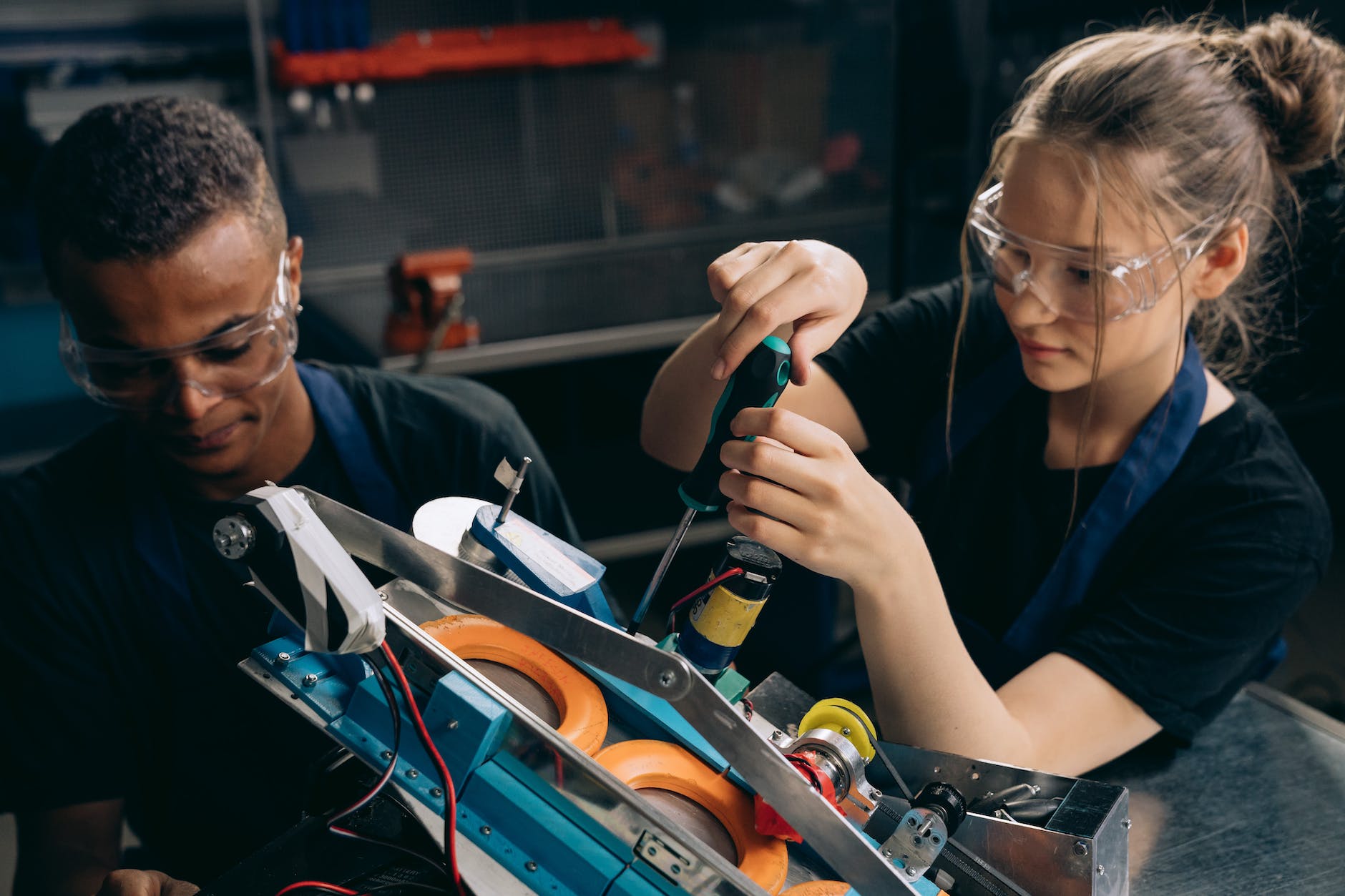
Photo by Antoni Shkraba on <a href="https://www.pexels.com/photo/photo-of-woman-writing-on-tablet-computer-while-using-laptop-4348401/" rel="nofollow">Pexels.com</a>
Artificial Intelligence (AI) is becoming increasingly ubiquitous in our world. From chatbots to self-driving cars, AI has revolutionized the way we work and live. One of the most significant impacts of AI is on job automation and the future of work. In this blog post, we will explore the impact of AI on job automation and discuss the future of work in the age of AI. We’ll also explore the skills you need to survive the AI-Powered job market.
What is AI?

Artificial Intelligence refers to the development of computer systems that can perform tasks that typically require human intelligence, such as speech recognition, decision-making, and language translation. AI algorithms can analyze large amounts of data and learn from it, making it possible for machines to recognize patterns, make predictions, and take actions based on that information.
The Impact of AI on Job Automation

One of the most significant impacts of AI on the workforce is job automation. AI can automate repetitive and routine tasks that are currently performed by humans. This means that many jobs that require little creativity or problem-solving could be replaced by machines.
According to a report by the McKinsey Global Institute, up to 375 million jobs may be automated by 2030.
The impact of AI on job automation is already being felt in many industries. For example, in the manufacturing industry, robots and other automated machines are replacing human workers on factory assembly lines. In the retail industry, self-checkout machines are replacing cashiers. In the transportation industry, self-driving trucks are being tested to replace truck drivers.
While job automation can increase efficiency and reduce costs for companies, it also has a significant impact on the workforce. Many workers who are currently employed in jobs that are at risk of automation may need to develop new skills to remain employable in the future.
The Future of Work in the Age of AI

As AI continues to advance, it will have a profound impact on the future of work. Some jobs will be eliminated, while others will require new skills and knowledge. This means that workers will need to be adaptable and flexible, constantly learning and developing new skills to keep up with technological advancements.
The future of work will require a different approach to education and training. Workers will need to learn skills that are in demand and have the ability to adapt to new technologies. This means that lifelong learning will become essential, with workers needing to continue learning throughout their careers.
In addition to learning new skills, workers will also need to develop soft skills, such as critical thinking, problem-solving, and creativity. These skills cannot be easily replicated by machines and will be in high demand in the future.
One of the reasons why soft skills are so important is that they cannot be easily replicated by machines. While AI is very good at performing routine and repetitive tasks, it’s not very good at creative problem-solving or critical thinking. These skills require a human touch, and workers who possess them are likely to be in high demand in the future.
Critical thinking is the ability to analyze information, evaluate arguments, and make logical decisions. In a world where information is abundant, workers who can think critically and make sense of complex data are valuable assets to any organization. They can help companies make informed decisions and solve complex problems.
Problem-solving is another soft skill that is in high demand. Companies are always looking for employees who can come up with creative solutions to complex problems. In an age where technology is constantly changing, workers who can adapt to new situations and find innovative solutions to problems are essential.
Creativity is also becoming increasingly important in the workforce. In a world where machines can perform routine tasks, workers who can think outside the box and come up with creative ideas are highly valued. Creative workers can help companies develop new products and services, and they can also help improve existing ones.
Interesting Facts
- According to a report by the McKinsey Global Institute, up to 375 million workers (about 14% of the global workforce) may need to switch occupational categories and learn new skills by 2030 due to automation and AI.
- A study by the World Economic Forum found that by 2025, machines are projected to perform more tasks than humans in the workplace.
- The Oxford Martin School estimates that 47% of jobs in the US are at high risk of automation in the next decade or two.
- According to a study by PwC, the adoption of AI and related technologies could create up to $15.7 trillion in additional economic output by 2030.
- Research by Deloitte shows that while automation will result in some job displacement, it is likely to create more jobs in the long run, with the new jobs requiring higher levels of skill and education.
- In a survey by Pew Research Center, 72% of Americans expressed worry about a future where robots and computers can do many jobs currently done by humans.
- A report by Gartner predicts that by 2022, one in five workers engaged in non-routine tasks will rely on AI to do their job.
- According to the Brookings Institution, AI and automation are likely to affect higher-paying jobs more than lower-paying ones.
- A study by MIT found that workplaces that successfully integrate AI and automation are more likely to have higher productivity and growth rates.
- In a survey by the World Economic Forum, 65% of respondents said that they believe that the adoption of AI and robotics in the workplace will lead to significant net job losses in their country over the next five years.
Conclusion
The impact of AI on job automation is already being felt in many industries, and this trend is expected to continue in the future. While job automation can increase efficiency and reduce costs for companies, it also has a significant impact on the workforce. Workers will need to develop new skills and knowledge to remain employable in the future.
The future of work in the age of AI will require a different approach to education and training. Workers will need to be adaptable and flexible, constantly learning and developing new skills to keep up with technological advancements. By embracing lifelong learning and developing soft skills, workers can prepare themselves for the future of work and ensure that they remain competitive in the job market.



